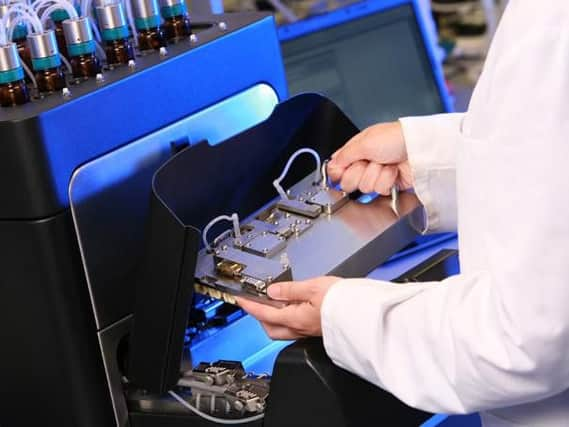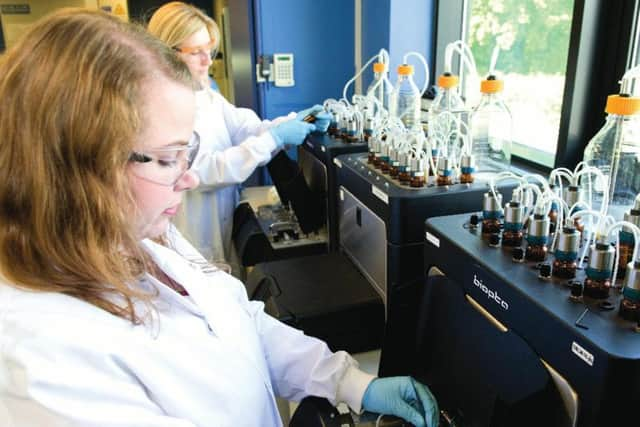Providing a catalyst for biotech growth in Scotland


Life sciences is a dynamic and growing sector, taking in specialisms such as medical technologies, biotechnology, animal health and plant sciences. It’s an exciting time, with advancements in technology and innovation opening the door to new treatments and techniques.
So when it comes to deciding which life sciences businesses to support, how does Scottish Enterprise select where to target its finite resources in an effort to deliver maximum impact?
Advertisement
Hide AdAdvertisement
Hide Ad“Life sciences pulls together many disciplines in biology, chemistry, engineering and computing,” says Julia Brown, the agency’s director for healthcare, life and chemical sciences.


“We therefore have a diverse range of companies contributing to the sector, each requiring special areas of support.
“Currently over 50 per cent of the life sciences sector in Scotland is made up of medtech or pharma services companies.
“Medtech covers both medical technology solutions and devices, while pharma services can be all kinds of support businesses for pharmaceutical companies – research, manufacturing, testing centres, packaging firms and so on.
“These strong areas significantly influence our priorities and our agenda, but our learnings can be applied to all areas in the sector to ensure everyone is part of the journey.”


Scottish Enterprise’s mission is to “help Scotland’s life sciences community build on its rich heritage of innovation, successful partnerships and pioneering research” and to “equip [companies] with the right skills, expertise and knowledge to grow their business at home and overseas, while maximising the future of the industry here in Scotland”.
Brown says the way Scottish Enterprise works with each life sciences business will depend on its need.
This means a package of support tailored by Scottish Enterprise to the specific focus of the business and involving, when necessary, the financial clout of the Scottish Investment Bank (SIB) and the overseas expertise of Scottish Development International (SDI).
Advertisement
Hide AdAdvertisement
Hide Ad“Compared to other sectors, life sciences requires significant investment, and lead-in times can be long before you see a return,” says Brown.
“We support a lot of life sciences companies through the SIB, which is one of the largest investors in life sciences at a UK level.
“In the first six months of this year, SIB invested £6 million in life sciences companies, leveraging some £19m from third-party investors.
“That support is very important in making sure businesses have enough capital to help them move forward, or to assist them with investment in research and development (R&D).
“When companies are perhaps looking to invest in new products or services, requiring R&D, we will look at grant applications.
“And if they are wanting to look at new markets, we can help them understand what they need to do and the people they need to meet to enable them to do that.”
There are a number of specific funding streams which Scottish Enterprise can help businesses access – including the Genomic Industrial Catalyst Fund, which helps to “facilitate collaboration, technology development and validation in the area of precision medicine in Scotland”.
More over-arching support includes an analysis of funding options to take a business on to the next level, business improvement workshops to increase profits and productivity and the Preparing to Export programme, to introduce a business to potential markets abroad.
Advertisement
Hide AdAdvertisement
Hide AdApril Kelly, account manager in the Scottish Enterprise company growth team, highlights the type of blended and targeted support through the agency’s work with REPROCELL Europe, a contract research organisation providing expertise in the use of living human tissues.
Kelly says: “It’s a very dynamic relationship and not always about cash support. For example, the Scottish Enterprise life science sector team and SDI field staff continue to provide useful connections and networks into the global research and clinical community for developing the company’s technology.”
Another example is the targeted and successful support Scottish Enterprise provided to TC Bio-Pharm, which aims to “develop and commercialise innovative cell-based products to target disease [with a significant focus on cancers], improving patient health and quality of life”.
Brown says: “One area of focus is supporting companies in the mid-to-late stages of product or service development, where they are relatively close to the market. We want to help them increase their sales domestically and internationally.”
Brown is also excited by the great things going on outside medtech and pharma services. “There are some really exciting drug discovery companies and early products development businesses like NuCana and IOmet Pharma,” she says.
IOmet, which set up at Edinburgh BioQuarter and was initially supported by SIB, was acquired by Merck (MSD) in 2016 for $400m.
The company discovers and develops novel small molecules for the treatment of cancer, with a focus on cancer immunotherapy and cancer metabolism.
“Companies in this space tend to need longer-term investment and support to get to market, or to partner up with a larger organisation, like IOmet did,” says Brown.
Advertisement
Hide AdAdvertisement
Hide Ad“Sticking to the theme of drug development, there is exciting work in this area in Dundee [University] – which was recently named as the most influential scientific research institution in the world in pharmaceuticals for the period 2006 to 2016 – and other academic institutions across Scotland.”
Scottish Enterprise has a very strategic role in the life sciences sector, working alongside universities, companies and the National Health Service. One example is the development of BioQuarter at Little France, Edinburgh.
“We acquired the land and worked with Edinburgh University, the NHS and the city council to develop the Edinburgh BioQuarter cluster,” says Brown.
“We have invested, in partnership with the UK Government, at Building No 9, an innovation facility for young businesses. We want to make it an ‘attractor’ for young talent and businesses to come to Scotland.
“It’s not just about bringing them to Edinburgh – a hub like BioQuarter can get international attention and act as a portal for the rest of Scotland.”
Another example of cluster development is BioCity based at Newhouse, east of Glasgow. “BioCity is an industry-focused site, offering laboratory and office space to companies of all sizes, but more importantly offers businesses a range of services to help reach their ambitions,” says Brown.
In addition, BioCity’s accelerator programme, which is supported by Scottish Enterprise, provides a mechanism for growing the cluster and creating successful companies of scale for the future.
It sums up Scottish Enterprise’s ambition for Scotland’s life sciences sector.
“We want an environment where companies can reach their full potential, create jobs, contribute to improving our healthcare system and, of course, grow the economy of the country,” says Brown.